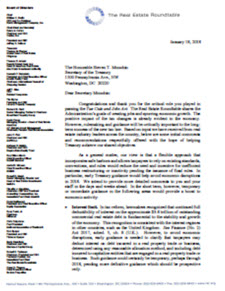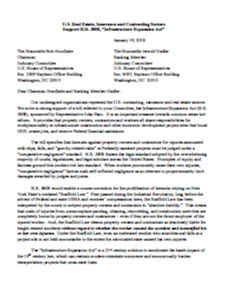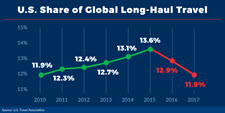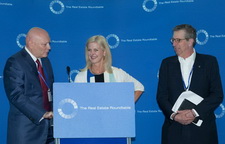Without a last-minute funding deal before midnight tonight, much of the federal government will shut down on the one-year anniversary of President Trump’s inauguration. The budget affects issues of importance to commercial real estate such as the National Flood Insurance and EB-5 foreign investment programs.
 |
In an effort to identify temporary or immediate guidance that would provide a boost to economic growth and jobs, Real Estate Roundtable President & CEO Jeffrey DeBoer yesterday wrote to Treasury Secretary Mnuchin, offering several suggestions aimed at ensuring the long-term success of the Tax Cuts and Jobs Act (TCJA). [Roundtable Letter, Jan. 18] |
Despite White House talks today between Minority Leader Chuck Schumer (D-NY) and President Trump, disagreements on immigration policies such as the Deferred Action for Childhood Arrivals (DACA, or "Dreamers") program threaten to scuttle a possible Senate vote on a government funding bill. If a deal is reached, the House is prepared to act again - after passing a fourth "Continuing Resolution" (CR) in FY2018 last night, which would extend government funding through Feb. 15.
The budget battle comes on the heels of last December's enactment of the largest overhaul of the tax code in 31 years. As businesses and individuals adjust to the new tax law's various provisions, it is expected that the IRS will issue guidance on technical questions affecting commercial real estate and other industries.
In an effort to identify temporary or immediate guidance that would provide a boost to economic growth and jobs, Real Estate Roundtable President & CEO Jeffrey DeBoer yesterday wrote to Treasury Secretary Mnuchin, offering several suggestions aimed at ensuring the long-term success of the Tax Cuts and Jobs Act (TCJA). [Roundtable Letter, Jan. 18]
The Jan. 18 Roundtable letter is based on input received from real estate leaders across the country, who share the goals of avoiding economic disruptions and reducing inefficient business restructuring or inactivity pending the issuance of final rules.
The Roundtable letter identifies several areas where rulemaking would reduce uncertainty and facilitate continued investment, including:
The letter describes each issue and suggests clarifications that would be useful, in the short term, to ensure the new tax law spurs investment, growth and job creation.
In conjunction with next week's Roundtable State of the Industry Meeting in Washington, DC, the Tax Policy Advisory Committee (TPAC) will analyze these areas in detail. Additionally, The Roundtable's business meeting will feature key congressional leaders, including Senate Minority Leader Schumer, who will engage attendees in a variety of policy discussions, including the current budget situation.
The Real Estate Roundtable, Associated General Contractors, and 16 U.S. organizations representing the contracting, insurance and real estate sectors today urged the House Judiciary Committee and key congressional offices to swiftly pass the Infrastructure Expansion Act of 2017 (H.R. 3808), sponsored by Rep. John Faso (R-NY). (Coalition Letter, Jan. 19)
 |
According to the coalition letter , the Infrastructure Expansion Act seeks to provide is a 21st century solution to ameliorate the harsh impact of an outdated 19th century law, which is restraining modern interstate commerce and economically burdening transportation projects that cross state lines. |
H.R. 3808 is a common sense tort reform effort aimed at correcting inequities from New York State's outdated "Scaffold Law." Passed during the Industrial Revolution – long before the advent of Federal and state Occupational Safety and Health Administration and workers' compensation laws – the Law holds property owners, employers, and contractors fully liable for all fall-related injuries at building and infrastructure construction sites.
As a result, courts have interpreted the New York law to subject property owners and contractors to "absolute liability." Under this standard, the costs of injuries from commonplace painting, cleaning, remodeling, and construction activities are completely borne by property owners and contractors, even if they do not directly employ the injured worker. The Scaffold Law also deems property owners and contractors as absolutely liable for height-related incidents, without regard to whether the worker caused the accident and intensified his or her own injuries. Under this standard, even an inebriated worker who stumbles and falls at a project site is not held accountable to the extent his intoxicated state caused his own injuries. (Roundtable Weekly, Oct. 27, 2017)
The House bill counters the absolute liability standard by specifying that lawsuits against property owners and contractors for injuries associated with slips, falls, and "gravity-related risks" at Federally-assisted projects should instead be held to a "comparative negligence" standard. When workers proximately cause their own injuries, comparative negligence factors such self-inflicted harm to proportionately limit damages awarded by judges and juries. H.R. 3808 fosters the comparative negligence legal standard adopted by the overwhelming majority of courts, legislatures, and legal scholars across the United States.
According to the coalition letter, the Infrastructure Expansion Act seeks to provide is a 21st century solution to ameliorate the harsh impact of an outdated 19th century law, which is restraining modern interstate commerce and economically burdening transportation projects that cross state lines.
 |
Rep. John Faso (R-NY) introduced the Infrastructure Expansion Act of 2017 (H.R. 3808) , intended to counter New York State’s “Scaffold Law.” |
Among specific examples offered in the letter showing the economic impacts of the Scaffolding Law is the Gateway Program, a Department of Transportation-assisted rail tunnel project of overwhelming national significance. The New York law is estimated to drive-up costs by as much as 300 million dollars for this project, which will modernize the power grid, update a century-old tunnel inundated by Superstorm Sandy, and help eliminate a train "bottleneck" in the Northeast Corridor that contributes $50 billion to US GDP annually. H.R. 3808 can help reduce the substantial added costs from insurance coverage, excessive litigation pay-outs, and project delays for interstate infrastructure construction like Gateway.
"On the heels of a major federal infrastructure initiative, Rep. Faso's bill is welcome news – enacting it would drive down costs of proposed infrastructure projects like the vital Gateway tunnel project between New York and New Jersey, said John Banks, President of the Real Estate Board of New York. (See REBNY Newsroom, Oct. 25, 2017).
Additionally, the Infrastructure Expansion Act of 2017 does not diminish or alter Federal or state OSHA obligations, nor does it foreclose "no-fault" workers' compensation.
The coalition letter addressed to House Judiciary Committee Chairman Bob Goodlatte (R-VA) and Ranking Member Jerrold Nadler (D-NY) concludes that H.R. 3808 "… simply makes property owners, contractors, and workers accountable for their own choices and conduct at construction sites benefitting from Federal taxpayer dollars. We encourage swift passage of the 'Infrastructure Expansion Act.'"
The Real Estate Roundtable joined 10 national trade organizations as a member of the "Visit U.S." Coalition, which launched on Wednesday with the goals of spurring job creation and economic growth while reversing a decline in international visitors to the United States. (Visit U.S., Jan. 16).
 |
According to the U.S. Travel Association, global travel volume to the United States from 2015 to 2017 fell from 13.6 percent to 11.9 percent — the first decline after more than a decade of consistent growth. The statistics also show that if the U.S. had maintained its 2015 international travel market share, its economy would have gained an additional 4 million international visitors, $32.2 billion in spending and 100,000 jobs. – enlarge chart – |
The coalition represents a broad cross-section of industries that have come together to address the recent drop in travel to the U.S. and resulting opportunity cost to the economy and jobs. According to the U.S. Travel Association, global travel volume to the United States from 2015 to 2017 fell from 13.6 percent to 11.9 percent — the first decline after more than a decade of consistent growth. The statistics also show that if the U.S. had maintained its 2015 international travel market share, its economy would have gained an additional 4 million international visitors, $32.2 billion in spending and 100,000 jobs.
"As a vital component of the commercial real estate industry, the U.S. hospitality sector provides significant capital investment, creates enormous job opportunities and encourages infrastructure improvements in local communities throughout the country," said Roundtable President and CEO Jeffrey DeBoer. "CRE is the provider of secure spaces where people live and play in the United States, and we welcome the opportunity to work with the Trump Administration and our coalition partners to encourage a positive uptick in international tourism to our cities, towns, destinations and attractions," added DeBoer.
Roundtable members were recently briefed on the drop in foreign travel to the United States and the economic ramifications by Katherine Lugar, president and chief executive officer of the American Hotel & Lodging Association (AHLA) — the largest trade association representing the U.S. lodging industry. (Roundtable Weekly, Oct. 6, 2017)
AHLA, a founding member of Visit U.S., supports policy initiatives such as reforms that enable safe and secure processing of visitor visas to strengthen business and leisure travel — as well as the H-2B program to provide valuable support for businesses looking to supplement their workforce with temporary seasonal employees when American workers are unavailable.
During the travel coalition's launch this week, Lugar said, "Fewer visitors means fewer hotel stays, fewer meals eaten in our restaurants, fewer goods purchased in our retail stores, and fewer visits to our national attractions. It also means fewer American jobs and a loss to our economy. We are committed to working together with the Administration to balance a welcome message with strong security to ensure we don't fall behind to other countries."
U.S. Travel Association President and CEO Roger Dow, another founding member of Visit U.S., added, "America is the best country in the world to visit, but we're losing the competition for international travelers and the dollars they spend when they come here. The Visit U.S. Coalition is founded on the principle that we can have strong security but at the same time welcome robust numbers of international business and leisure travelers. We can do both."
 |
Left to Right: Roundtable President and CEO Jeffrey DeBoer, American Hotel & Lodging Association President and CEO Katherine Lugar , and Roundtable Chairman William C. Rudin ( Rudin Management Company, Inc .) – enlarge photo – |
"The U.S. economy is on the upswing, but we can grow even more by encouraging more travel to America," said U.S. Chamber of Commerce President and CEO Thomas J. Donohue, also part of the coalition. "Travel creates jobs and economic activity across a swath of industries and sectors as people visit the U.S. and spend their time and money with American businesses. The Chamber is proud to join with our partners in the business community to make the case for a renewed focus on travel as a driver of economic growth and American prosperity."
Media coverage regarding the coalition's launch includes: